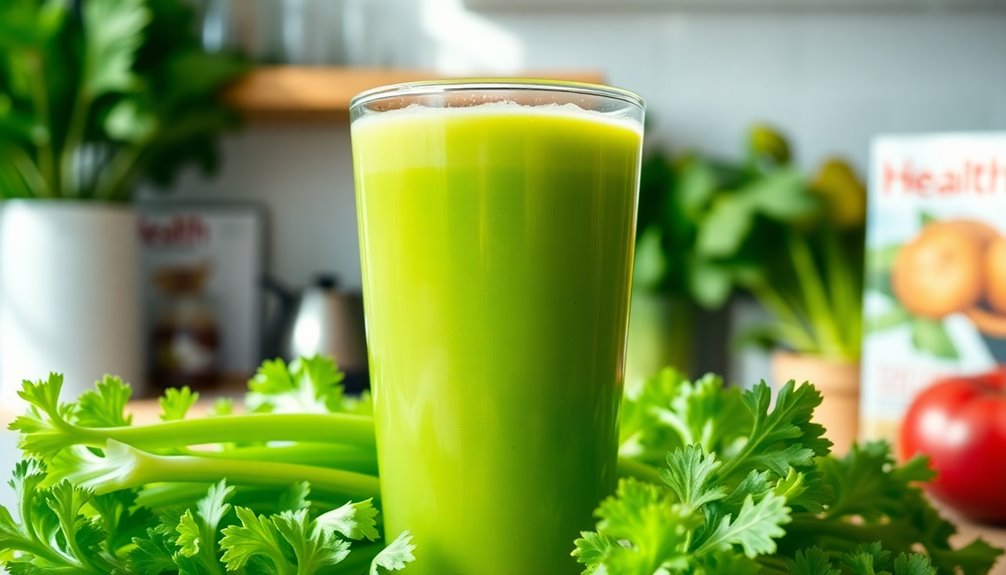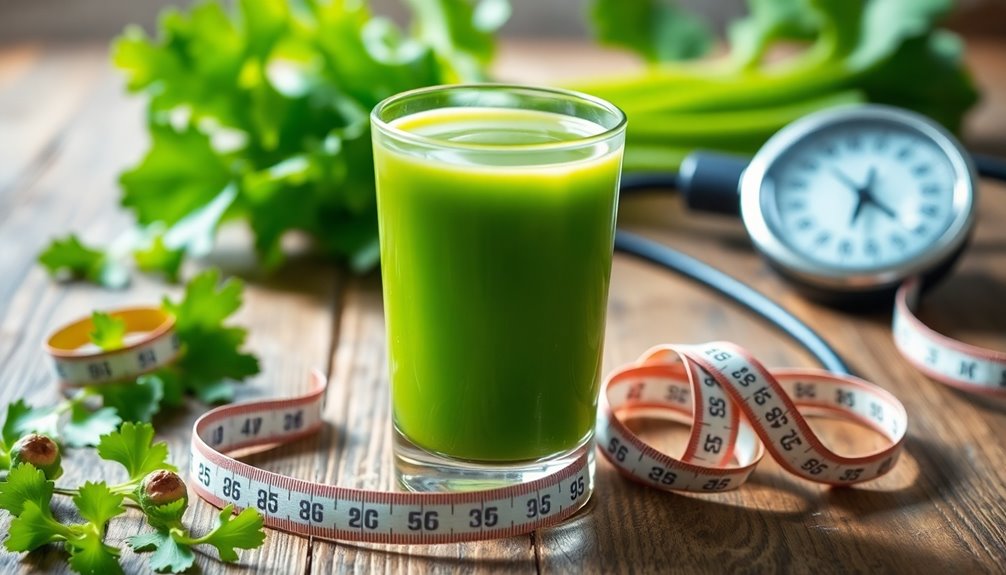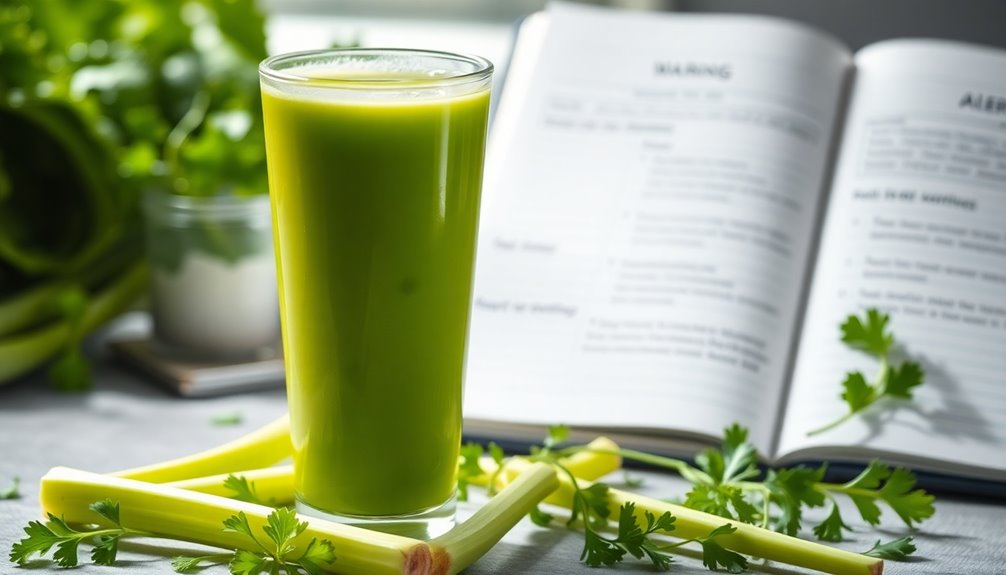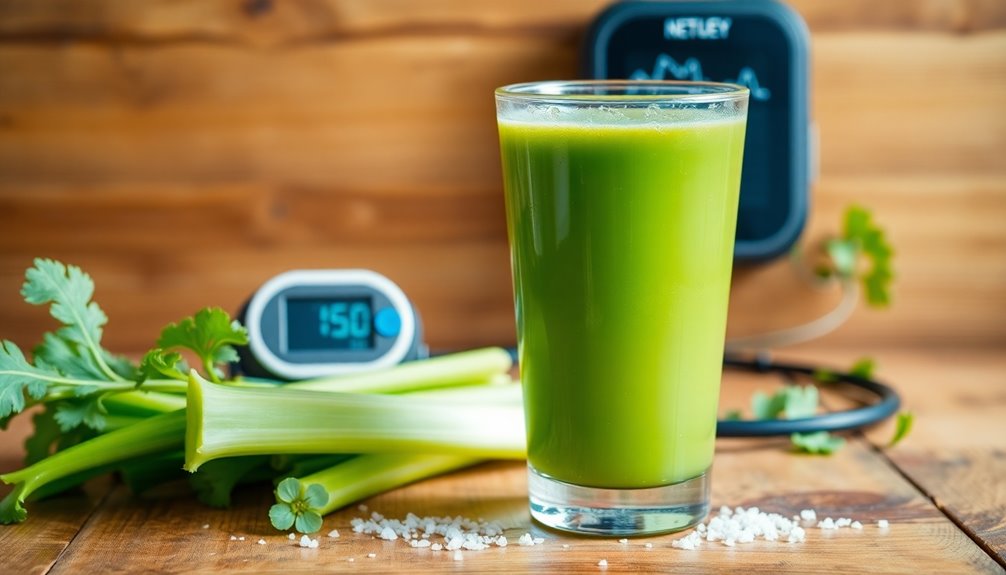Celery juice has become popular for managing high blood pressure, but its effectiveness might not be as miraculous as some believe. While it contains antioxidants and phytonutrients that can support heart health, the lack of fiber may diminish its benefits. Whole celery provides essential nutrients and fiber that are vital for blood pressure management. It's important to combine celery juice with a balanced diet and healthy lifestyle choices for better results. Discover what more you need to know about this health trend.
Key Takeaways
- Celery juice contains antioxidants and phytonutrients that may help reduce inflammation and support heart health, but evidence for significant blood pressure improvement is limited.
- Whole celery offers similar nutrients and fiber, which is essential for blood sugar stability and digestive health, making it a better overall choice.
- Celery juice is low in calories and hydrating, but lacks fiber, which diminishes its effectiveness in promoting heart health compared to whole celery.
- While celery juice can be part of a balanced diet, it should not be relied on solely for managing high blood pressure.
- Consult healthcare providers if on blood thinners, as celery's high vitamin K content may interact with medications.
Understanding Celery Juice and Its Popularity

Celery juice has surged in popularity as a health trend, especially among those seeking natural remedies for various conditions, including high blood pressure.
Many people believe that the phytonutrients in celery, particularly flavonoids, offer health benefits due to their anti-inflammatory properties. These compounds may contribute to better blood pressure control, making celery juice a go-to choice for some.
However, while some health claims suggest miraculous results, you should approach these with caution. Limited scientific studies directly link celery juice consumption to significant improvements in blood pressure, highlighting the need for more research.
Nutritional Profile of Celery Juice

When you consider the nutritional profile of celery juice, you'll find it's low in calories and packed with hydration.
While it lacks the fiber that whole celery offers, it does contain beneficial antioxidants and phytonutrients that can support your heart health.
Understanding these nutrient dynamics can help you make informed choices about incorporating celery juice into your diet.
Nutrient Density Overview
While you might think of celery juice as just another trendy health drink, its nutrient density reveals a wealth of benefits, particularly for heart health. Celery juice is rich in antioxidants, vitamins, and minerals that contribute to overall wellness and can aid in reducing inflammation. Additionally, research suggests that the low glycemic index of celery may offer celery juice benefits for diabetics, helping to stabilize blood sugar levels. This makes it an excellent choice not only for those focusing on heart health but also for individuals managing diabetes.
This low-calorie, hydrating option is rich in phytonutrients, especially antioxidants like apigenin and luteolin, known for their anti-inflammatory properties that support cardiovascular health.
With about 50 milligrams of sodium per cup, celery juice helps you manage your sodium intake, essential for controlling high blood pressure.
Additionally, it boosts your potassium intake, a crucial mineral that aids in eliminating excess sodium from your body, further contributing to better blood pressure management.
Moreover, incorporating seeds like chia into your diet can enhance your nutrient intake and support heart health.
Fiber Content Comparison
Although celery juice is often praised for its hydrating properties, it falls short in fiber content compared to whole celery. A single stalk of raw celery contains about 1 gram of dietary fiber, which is vital for digestive health and blood pressure management.
When you juice celery, most of this beneficial fiber is lost. This lack of dietary fiber means celery juice isn't the best choice if you're aiming for a healthy diet that supports cardiovascular health.
Whole celery provides essential fiber, helping stabilize blood sugar levels and contributing to significant decreases in blood pressure. For those looking to maintain a healthy lifestyle, incorporating whole celery is a smarter option than relying solely on celery juice for hydration. Additionally, the high vitamins A, C, and K content in whole celery can further support immune health and overall well-being.
Antioxidants and Phytonutrients
Juicing celery offers a concentrated source of antioxidants and phytonutrients that can play a significant role in supporting cardiovascular health.
Celery juice is rich in powerful antioxidants like apigenin and luteolin, which can help reduce inflammation and lower blood pressure. The phytonutrients found in celery, including flavonoids, actively combat oxidative stress caused by free radicals, benefiting your heart.
Additionally, the high water content in celery contributes to your hydration, essential for maintaining healthy blood pressure levels. By juicing celery, you concentrate these beneficial compounds, making it easier for you to consume a potent dose of nutrients that support overall cardiovascular health. Moreover, incorporating herbal alternatives like hibiscus can further enhance the cardiovascular benefits of your diet.
Just remember, while celery juice is beneficial, whole celery provides important fiber for digestion and blood pressure management.
Potential Health Benefits of Celery Juice

When considering natural ways to support heart health, celery juice emerges as a promising option due to its rich nutrient profile. Packed with phytonutrients like apigenin and luteolin, celery juice may help reduce inflammation and contribute to lowering blood pressure.
Medical professionals recommend consuming four stalks of celery daily for effective blood pressure management, emphasizing its potential as a natural remedy. Additionally, celery acts as a natural diuretic, promoting the elimination of excess sodium from your body, which can aid in managing hypertension.
While direct studies on celery juice's effects are limited, its health benefits support its place in a heart-healthy diet, making it a beneficial addition to your daily routine. Furthermore, incorporating foods like raw summer squash can enhance overall nutrition and support weight loss efforts.
The Role of Phytochemicals in Blood Pressure Management

Phytochemicals play an essential role in managing blood pressure, and celery is a rich source of these beneficial compounds.
Flavonoids like apigenin and luteolin found in celery combat inflammation and oxidative stress, both linked to high blood pressure. Traditional practices, such as Traditional Chinese Medicine, have long recommended celery for its potential to naturally lower blood pressure.
Studies show that celery acts as a natural diuretic, promoting sodium elimination, which helps reduce blood pressure levels. Additionally, the potassium content in celery balances sodium levels, further supporting cardiovascular health.
Myths and Misconceptions About Celery Juice

While many people tout celery juice as a miracle solution for high blood pressure, it's important to approach these claims with skepticism.
You might hear myths suggesting that celery juice alone can cure your hypertension, but the reality is far from it. The health benefits attributed to celery juice aren't exclusive to its liquid form; whole celery offers similar nutrients and fiber that are essential for managing blood pressure.
Juicing strips away this vital fiber, making it less effective for overall health. To truly combat high blood pressure, focus on a balanced diet rich in a variety of vegetables.
Relying solely on celery juice won't provide the thorough benefits you need for peak health. Don't fall for the hype!
Whole Celery vs. Celery Juice: What's Best?

When choosing between whole celery and celery juice, it's important to contemplate their nutritional content.
Whole celery provides more fiber, which is essential for gut health and blood sugar management, while celery juice offers a concentrated dose of nutrients. Additionally, celery is rich in vitamins A, C, and K, which are beneficial for overall health and can support bodily functions.
Understanding these differences can help you decide which option best supports your health needs.
Nutritional Content Comparison
Understanding the nutritional differences between whole celery and celery juice is crucial for making informed dietary choices, especially for those managing high blood pressure.
Whole celery boasts higher nutritional value, providing about 1.6 grams of fiber per serving, which aids digestion and stabilizes blood sugar levels. In contrast, celery juice has negligible fiber content, leading to reduced health benefits.
While juicing can concentrate certain nutrients, it often results in nutrient loss, meaning you miss out on essential vitamins and minerals found in whole celery. Additionally, whole celery contains phytonutrients that enhance its health benefits, offering a more thorough approach to supporting blood pressure management.
For best results, consider incorporating whole celery into your diet. Moreover, the high fiber content in whole celery plays a significant role in promoting digestive health.
Fiber Retention Differences
Whole celery and celery juice differ considerably in their fiber content, impacting their effectiveness for managing blood pressure. When you opt for whole celery, you retain:
- Crucial dietary fiber that helps regulate blood sugar.
- A significant reduction in hypertension risk due to fiber's blood pressure-lowering benefits.
- Important nutrients that support overall cardiovascular health.
In contrast, the juicing process strips away this fiber, leaving celery juice concentrated in nutrients but lacking the health benefits necessary for effective blood pressure management.
While both forms offer advantages, incorporating whole celery into your diet can enhance fiber retention, promoting better blood pressure control. Additionally, a diet rich in whole foods can further improve cardiovascular health and support blood pressure management.
Balancing your intake of whole celery and celery juice guarantees you maximize their nutritional benefits while addressing hypertension effectively.
Health Benefits Overview
While both whole celery and celery juice offer unique health benefits, choosing the right option for managing blood pressure can be vital.
Whole celery is a powerhouse with its fiber content, essential for maintaining healthy weight and supporting gut health. The phytochemicals found in both forms, like flavonoids, may help reduce high blood pressure and combat inflammation.
Although celery juice concentrates nutrients for easier consumption, it does come with nutrient loss, making whole celery the better choice overall.
Regularly eating whole celery supports cardiovascular health due to its potassium, which helps eliminate sodium and lower blood pressure. Additionally, the flavonoids found in celery may contribute to reducing inflammation, further supporting heart health.
Incorporating Celery Juice Into a Balanced Diet

Incorporating celery juice into your balanced diet can be a simple yet effective way to support your overall health, especially when it comes to managing blood pressure.
Here's how you can enhance your diet:
- Start your day with an invigorating glass of celery juice, aiming for four stalks to maximize nutrients and potential blood pressure benefits.
- Pair it with fiber-rich foods like whole grains and legumes, which are essential for heart health and long-term blood pressure control.
- Add variety by including leafy greens and tomatoes in your meals, boosting potassium intake for better cardiovascular health. Additionally, incorporating anti-inflammatory foods can further support overall wellness and blood pressure management.
Safety Considerations and Allergies

Before adding celery juice to your routine, it's essential to evaluate potential safety issues and allergies.
Celery allergies can lead to severe reactions, including anaphylaxis, so be mindful if you have a known allergy.
If you're on blood thinners, consult healthcare providers before consuming large amounts due to celery's high vitamin K content, which can interact with your medications.
While some believe in its detoxifying effects, limited research suggests that celery juice may not deliver these benefits, and excessive intake can lead to side effects.
Always consult a medical professional before making significant dietary changes, especially if you have existing health conditions or concerns regarding celery.
Prioritizing safety considerations guarantees a healthier approach to incorporating celery juice into your diet.
The Importance of Lifestyle Choices in Blood Pressure Control

Making informed lifestyle choices is essential for effectively managing blood pressure. To achieve ideal health effects, consider incorporating these strategies:
- Drink celery juice regularly to benefit from its high fiber content and potassium, both known for lowering blood pressure.
- Maintain a balanced diet rich in vegetables like leafy greens and bananas to help eliminate excess sodium.
- Engage in regular physical activity; it enhances heart health and circulation, vital for blood pressure control.
These choices, combined with stress management and reduced alcohol intake, can greatly impact your cardiovascular health.
Frequently Asked Questions
Should You Drink Celery Juice if You Have High Blood Pressure?
If you have high blood pressure, drinking celery juice can offer some benefits, but it shouldn't be your only focus.
While celery juice contains beneficial compounds, consuming whole celery is more effective due to its fiber content. Aim for four stalks of celery daily, and consider cooking it to enhance its blood pressure-lowering properties.
How Long Does It Take Celery to Lower Blood Pressure?
Imagine planting a seed in your garden. Just like that, when you start eating celery, you might see changes in your blood pressure in a few days to weeks.
If you munch on four stalks daily, you're nurturing that seed, helping it grow. Cooked celery can be more potent, like watering your plant with rich nutrients.
What Are Three Disadvantages of the Celery Juice Diet?
When considering a celery juice diet, you might face a few disadvantages.
First, you lose much of the fiber, which is essential for digestion and blood sugar control.
Second, the scientific evidence supporting celery juice's health benefits is limited, so you may not see the results you expect.
Ultimately, relying on it exclusively could lead you to neglect necessary medications or lifestyle changes, which are crucial for overall health and well-being.
Can Celery Unclog Arteries?
You might wonder if celery can unclog arteries. While it's packed with phytochemicals and antioxidants that support heart health, there's no direct evidence that it can physically unclog arteries.
However, its high potassium content helps maintain healthy blood pressure, and the fiber in whole celery can lower cholesterol.
Incorporating celery into your diet can contribute to overall cardiovascular health, but it should complement a balanced diet and healthy lifestyle for the best results.
Conclusion
Incorporating celery juice into your diet can be like adding a revitalizing splash of water to a dry sponge—helping you absorb essential nutrients and benefits. While it might support better blood pressure management, it's not a magic potion. Remember, a balanced approach that includes a healthy diet and lifestyle choices is key to keeping your blood pressure in check. So, sip that celery juice, but don't forget to nourish your body in other ways too!
Cindy thoroughly researches juicing trends, techniques, and recipes to provide readers with practical advice and inspiration. Her writing style is accessible, engaging, and designed to make complex concepts easy to understand. Cindy’s dedication to promoting the advantages of juicing shines through her work, empowering readers to make positive changes in their lives through the simple act of juicing.











